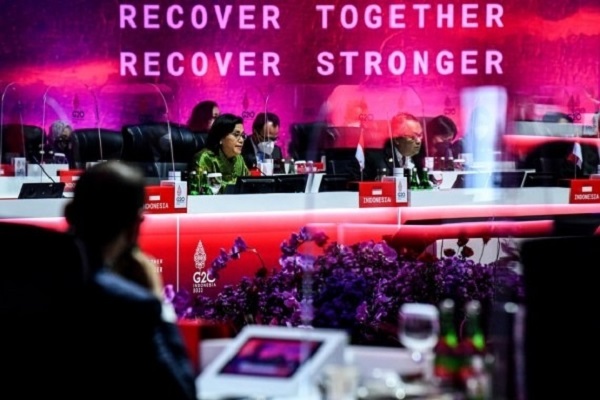
Jakarta, (Asian independent) The Finance Ministers and central bank governors of the G20 nations are seeking sustainable international financing scheme to build global resilience in facing potential future pandemics and reduce gaps in health systems among countries.
The financial leaders addressed the issues on Thursday, either in person or virtually, during a two-day G20 Finance Ministers and Central Bank Governors (FMCBG) meeting held in Jakarta, with Indonesia serving as the host country, reports Xinhua news agency.
Indonesia’s Finance Minister Sri Mulyani Indrawati told the G20 participants in a panel discussion that the Covid-19 pandemic has revealed that the global health system is not ready enough to face the pandemic and the global financing system is still inadequate.
“Therefore, the G20 member countries should collaborate to build a more resilient global health system which will, indeed, require greater investment and financial resource mobilisation,” she said.
World Bank Group President David Malpass suggested that the G20 countries build multilateral platforms that could help developing and low-income countries move forwards out of the crisis.
Indian Finance Minister Nirmala Sitharaman pointed out that low and middle-income countries do not have enough resources to deal with the pandemic and need global support.
Thus, she encouraged the G20 member countries to ensure “expeditious and equitable distributions of vaccines” as one of the simple ways to bridge the gaps in global pandemic preparedness.
Norwegian International Development Minister Anne Beathe Tvinnereim said that besides vaccines, the countries must also coordinate in building stronger healthcare infrastructures by increasing international investment in health security.
“We must avoid fragmentation and push for inclusiveness. We need the voices from low-income countries as well. They should be considered legitimate,” Tvinnereim said.
Meanwhile, US Treasury Secretary Janet Yellen proposed a new separate global health fund, directly controlled by donors, as a global investment for pandemic prevention and preparedness.
Under her proposal, the fund will be used for delivering emergency funds, vaccines, and other medical needs.
Yellen said the fund would also help the developing and low-income countries improve the surveillance systems to prepare for future crises and help strengthen the countries’ healthcare workforces.
Responding to the proposal, World Health Organization (WHO) Director-General Tedros Adhanom Ghebreyesus emphasized that “any efforts to enhance the governance, systems and financing of global health security can only succeed if they also enhance the WHO’s role”.
He said that the WHO, with its unique mandate, technical expertise and global legitimacy, should be made stronger and sustainably financed because the organisation played a central role in strengthening the global health architecture.
Indrawati said that it would not be an easy and simple process to build trust among countries.
“That is why we are here to provide a platform to build trust together. We cannot do it alone. We should be open-minded to what challenges we are facing and what responsibility we can take.”
Indrawati noted that the G20 meeting should be the momentum for parties concerned to start mobilising health financing for the importance of public goods.







